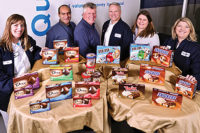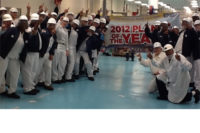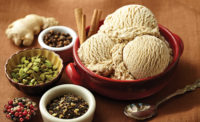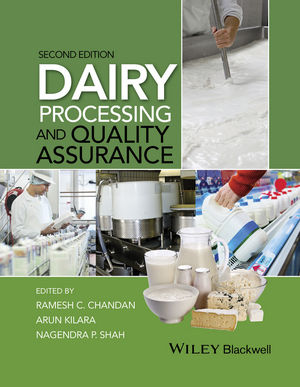“We believe we make the best caramel in the industry, and we believe consumers can see and taste the difference,” Latham says. “As such, we make our own caramel from scratch in a controlled manner with rigid quality standards. It’s the care, time and precision that make the difference.”
The other signature ingredient in many products is the peanut. Mars sources these from Albany, Ga. These are the same peanuts used in Snickers candy bars. In Burr Ridge, Mars makes peanut butter from the peanuts and blends it into the ice cream mix used to make the Snickers Ice Cream Bars.
Dove Bar Ice Cream stick novelties used to be hand-dipped; now that process is automated. The ice cream bar line produces Dove Ice Cream Minis, Snickers, Twix and the soon-to-be-released Milky Way Ice Cream bars. Thirty-six nozzles on the freezer extrude ice cream into continuous ropes. If the company is making Milky Way Ice Cream bars, then a second nozzle lays down a bead of caramel in an indentation on the top of the product. The extrusions, having the consistency of soft-serve ice cream, pass through a block-long tunnel freezer where the temperature is about minus 40˚F.
Upon exiting this freezer, the now rock-hard extrusions are guillotined into portions. The final bar size depends upon the product and retail channel. Items sold in boxes in grocery stores weigh a few ounces less than SKUs sold singly in convenience stores.
The portioned items are then conveyed to an enrobing station, essentially a shower of liquid chocolate. At the same time, the bars move through a chocolate bath to ensure coverage on the bottom. Next, the pieces are blast-frozen to harden the chocolate, and then they are conveyed to packaging.
There are multiple packaging lines, and sensors direct the bars to whichever line is available. Wrapped product is put into boxes which are conveyed to the secondary packaging station.
Mars processes milder flavors (vanilla) first and stronger ones (peppermint) last. Likewise, products containing peanuts or other allergens are processed after non-allergenic foods.
Quality control
Mars pulls samples every hour for quality control. Every morning, a quality assurance team inspects random samples of the foods and the packaging.
“We have a fully developed quality program that details which product attributes we examine for each of the products we make,” says Craig Hall, the general manager of the business. “The final step is, of course, to taste the product to make sure it meets our high standards,”
A poster on the wall of the room used for the Daily Quality Meeting states: “The consumer is our boss. Quality is our work. And value for money is our goal.” There is also a “peanut changeover pledge” signed by employees who vow to remove peanuts “from nooks and crannies” on the line.
Hall says Mars has “a very proactive supplier certification program as well as an in-house auditing program that we believe is innovative.” It is based on parent company Mars Inc.’s Five Principles, the first of which is Quality. (See related article.)










